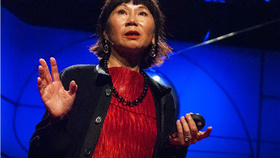The Value of Nothing: Out of Nothing Comes Something.
無的價值:無中生有的可能。
That was an essay I wrote when I was 11 years old and I got a B+.
這是一篇我在十一歲時寫的作文,當時我拿了個乙等。
What I'm going to talk about: nothing out of something, and how we create.
今天我要談的是創作和無中生有的藝術。
And I'm gonna try and do that within the 18-minute time span that we were told to stay within, and to follow the TED commandments:
我不但要試著在大會給我的18分鐘時限中完成,并且遵守TED的嚴格戒律:
that is, actually, something that creates a near-death experience, but near-death is good for creativity. OK.
我必須說,這些戒律的確讓我有一種瀕臨死亡的感覺,但瀕臨死亡是有益于創作的。好。
So, I also want to explain, because Dave Eggers said he was going to heckle me if I said anything that was a lie,
我還想順便提到,如果我說謊,大衛·艾格說他將會嚴厲地質問我。
or not true to universal creativity. And I've done it this way for half the audience, who is scientific.
或是說的東西不能普世通用。這個圖是為了聽眾中的科學家畫的。

When I say we, I don't mean you, necessarily; I mean me, and my right brain,
當我使用“我們”的時候,我不一定是指你,而是說我和我的右腦,
my left brain and the one that's in between that is the censor and tells me what I'm saying is wrong.
我的左腦,還有在它們中間那負責審查的東西,如果我說錯了什么,它將會提醒我。
And I'm going do that also by looking at what I think is part of my creative process,
我也將會談論我個人的創作過程,
which includes a number of things that happened,
那包含了一些不同的事件,
actually -- the nothing started even earlier than the moment in which I'm creating something new.
無在更早之前發生,在我開始創作之前就發生了。
And that includes nature, and nurture, and what I refer to as nightmares.
那包括了天份,滋養,還有我叫做夢魘的東西。











